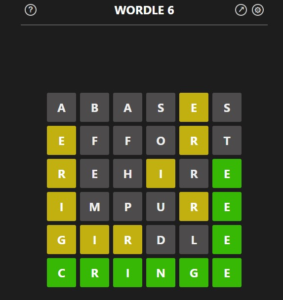Finding Meaning in Simplicity
As of today, my Wordle stats reflect 18 games played, boasting a current streak of 14 and a flawless 100% win rate. What began as a fleeting curiosity has evolved into a daily ritual—thirty minutes dedicated to escaping the world’s troubles as I delve into a five-letter puzzle.
Wordle has undeniably taken the world by storm, attracting around 3 million players globally. The game’s premise is beautifully simple: you have six attempts to guess a five-letter word, and with each guess, the game reveals if a letter is correctly placed (a green box), misplaced (a yellow box), or absent (a grey box).
The game is refreshingly minimalist. There are no ads, no banners, no pop-ups, and no appeals for donations—nothing but six rows of boxes and a keyboard at the bottom. It’s a breath of fresh air in a digital landscape cluttered with distractions.
This simplicity is what makes Wordle so captivating. In a world that constantly demands our attention, Wordle offers a quiet escape—a soothing, consistent presence amid chaos. Moreover, the shared commitment among players to keep the daily word a secret adds to the thrill. It’s a remarkable feat, considering our tendency to share everything at the speed of light.
Wordle’s meteoric rise hasn’t gone unnoticed. Recently, the New York Times announced its acquisition of the game for a modest seven-figure sum, sparking concerns about potential paywalls. However, creator Josh Wardle has reassured fans that Wordle will remain free.
What draws me to Wordle is not just its gameplay but the heartfelt story behind its creation. Born out of love by former Reddit software engineer Josh Wardle for his puzzle-loving partner Palak Shah, the game was initially designed as a way to pass time during the pandemic. They generously shared it with the world, and now they’re reaping the rewards.
That’s the beauty of stories. On its own, Wordle is merely an entertaining distraction from the daily grind of remote work. Yet, paired with a narrative of love and companionship, it transforms into something profound. I can’t help but feel a sense of responsibility to keep this love letter alive, ensuring it doesn’t fade from our collective memory too soon.
This theme of storytelling resonates with me as I recall a conversation I had with Alastair and Jon, the charismatic hosts of the ‘In My Opinion’ podcast. They recently invited me to discuss content creation and censorship in the digital age. Jon admitted that he isn’t the type to read articles, preferring videos and brief clips over lengthy reads that demand commitment.
“How do you, as the editor of a media publication, reckon with a world filled with people like me?” he asked.
“It’s not that you don’t like to read, Jon,” I responded. “You just haven’t found the right story yet.”
Perhaps I’m biased, given my position, but I believe we are all on a perpetual quest for the perfect story—narratives that resonate with our values, challenge our beliefs, and give voice to the unheard. This task becomes increasingly daunting, especially for independent and alternative media like Rice, which strives to publish stories that deserve greater recognition in Singapore and beyond.
In a competitive landscape dominated by YouTube, TikTok, and Instagram, we know that Rice can’t encapsulate every story our loyal readers desire. Yet, we persist. We navigate numerous limitations, and while we wish to publish every idea in our growing Ideas Bank, we recognize the reality that it’s not feasible—at least not yet.
One day, I hope Rice will expand into a major news outlet like the New York Times, employing numerous journalists, writers, and analysts to cater to a diverse readership. In that moment, we can unlock the potential of a simple game like Wordle and elevate it to new heights.
If that day arrives, you’ll know you read it here first. Until then, thank you for your support and for being a valued reader.








